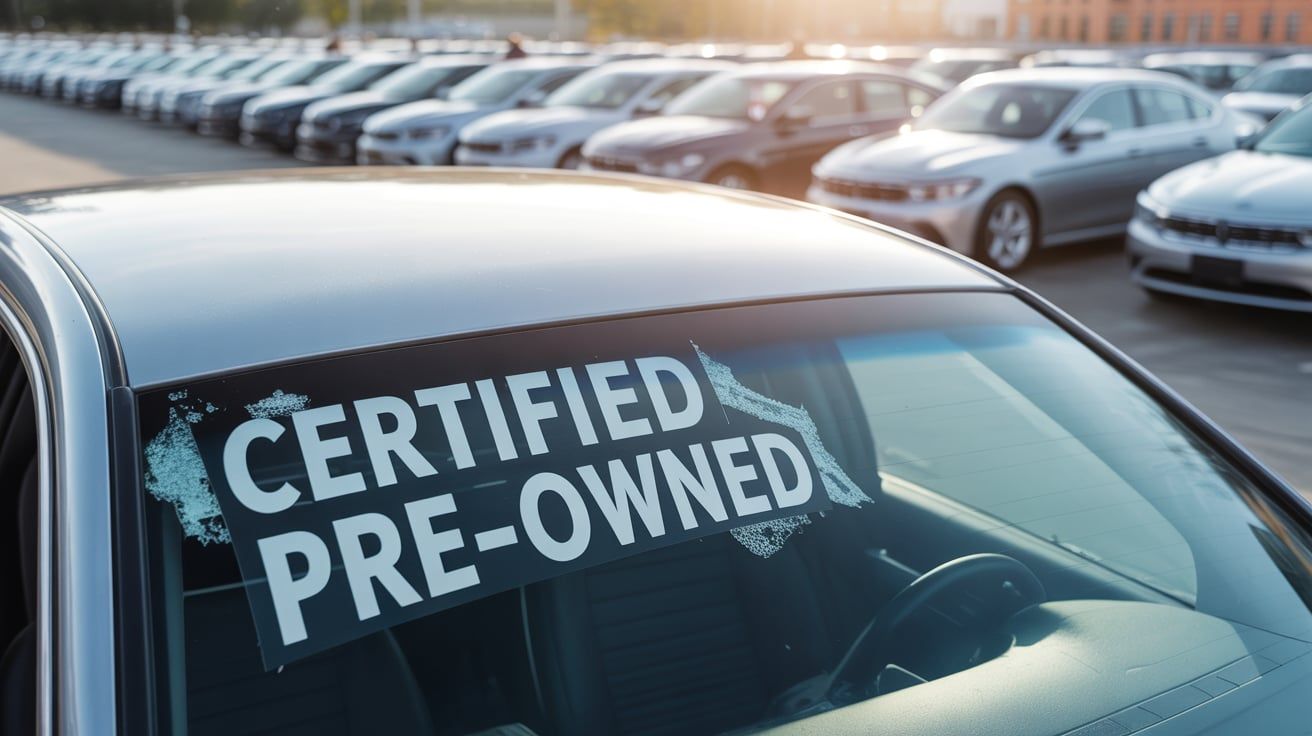
The Certified Pre-Owned Illusion
Imagine this: you’re standing on a used car lot, the sun glinting off rows of vehicles. You’re drawn to a gleaming sedan with a “Certified Pre-Owned” sticker proudly displayed. It sounds reassuring, doesn’t it? Like a safe haven in the often-murky waters of used car buying. But what if I told you that “certified” doesn’t always mean what you think it does? That the promise of quality and reliability can sometimes be more of a marketing tactic than a guarantee of a pristine vehicle? The truth is, the world of Certified Pre-Owned (CPO) cars is more nuanced than dealerships often let on, and understanding the ins and outs can save you thousands of dollars and a whole lot of headaches.
We’ve all heard the horror stories of used cars that turned out to be lemons, plagued with hidden problems and costly repairs. The CPO label is designed to alleviate those fears, offering a sense of security and peace of mind. But before you sign on the dotted line, it’s crucial to understand exactly what that certification entails, and more importantly, what it *doesn’t* cover. Let’s dive into the secrets car salesmen often keep hidden about CPO vehicles, and equip you with the knowledge to make a truly informed decision.
Decoding the Certification Process
The term “Certified Pre-Owned” sounds official, almost like a government-regulated standard. However, the reality is that CPO programs are primarily run by the automotive manufacturers themselves, or sometimes by individual dealerships. This means the criteria for certification can vary wildly from brand to brand, and even from dealership to dealership within the same brand. What one manufacturer considers “certified” might be vastly different from another. For example, one program might require a 172-point inspection, while another only mandates a cursory check of a few key components.
Furthermore, the inspection process itself can be subjective. While a checklist might exist, the thoroughness of the inspection often depends on the individual mechanic and the dealership’s commitment to quality. A rushed or poorly executed inspection can easily miss underlying issues, rendering the certification essentially meaningless. Don’t assume that because a car is “certified,” it’s been meticulously scrutinized from bumper to bumper. Always ask for a detailed copy of the inspection report and, if possible, have an independent mechanic review it.
The Fine Print of CPO Warranties
One of the biggest draws of a CPO vehicle is the extended warranty that typically comes with it. This warranty is designed to protect you from unexpected repair costs, providing coverage for a specific period or mileage after your purchase. However, it’s crucial to read the fine print carefully, as CPO warranties often have limitations and exclusions. For instance, some warranties only cover major mechanical components like the engine and transmission, while excluding smaller but still costly repairs like the air conditioning system or the infotainment system.
Another important factor to consider is the deductible. Many CPO warranties require you to pay a deductible for each repair visit, which can add up over time. Also, be aware of any restrictions on where you can have the car serviced. Some warranties require you to use the dealership’s service department, which may charge higher labor rates than independent mechanics. Understanding the specific terms and conditions of the CPO warranty is essential to avoid unpleasant surprises down the road. Don’t hesitate to ask the salesman to explain the warranty in detail and provide you with a written copy for your review.
Hidden Damage and Accident History
A common misconception is that all CPO cars are accident-free. While many CPO programs require a clean title, meaning the car hasn’t been declared a total loss, they don’t necessarily guarantee that the vehicle has never been in an accident. Minor accidents or cosmetic damage might not be reported to insurance companies or reflected on the vehicle’s history report, allowing a damaged car to slip through the certification process. This is especially true for electric cars, where battery damage from a minor fender-bender might not be immediately apparent but could lead to long-term performance issues.
Always obtain a vehicle history report from a reputable source like Carfax or AutoCheck, even if the dealership claims to have already done so. Compare the report to the dealership’s inspection report and look for any discrepancies. Pay close attention to the number of previous owners, the accident history, and any reported damage. If you have any doubts, consider having the car inspected by an independent body shop to check for signs of previous repairs or hidden damage. Remember, a clean title doesn’t always mean a clean history.
The Price Premium: Is It Worth It?
CPO cars typically command a higher price than non-certified used cars. This price premium is justified by the perceived benefits of certification, including the inspection, warranty, and peace of mind. However, it’s important to evaluate whether the added cost is truly worth it for your specific needs and budget. Compare the price of the CPO vehicle to similar non-certified models, taking into account the mileage, condition, and features. Consider the cost of purchasing an extended warranty separately for a non-certified car, and weigh that against the price difference of the CPO option.
In some cases, the CPO price premium might be justified, especially if you value the added security and warranty coverage. However, if you’re a savvy shopper who’s willing to do your research and potentially take on a bit more risk, you might be able to find a comparable non-certified car for a significantly lower price. Ultimately, the decision depends on your individual risk tolerance and your ability to thoroughly inspect and evaluate the vehicle’s condition. Don’t automatically assume that CPO is the best value; do your homework and compare all your options.
Negotiating the CPO Price
Just because a car is “certified” doesn’t mean the price is set in stone. Like any other car purchase, you should always negotiate the price of a CPO vehicle. Start by researching the fair market value of the car using online resources like Kelley Blue Book or Edmunds. Use this information as a starting point for your negotiations. Point out any flaws or imperfections you find during your inspection, even if they’re minor. These can be used as leverage to lower the price.
Don’t be afraid to walk away if the dealership isn’t willing to meet your price. There are plenty of other CPO cars out there, and you shouldn’t feel pressured to settle for a deal that doesn’t feel right. Remember, the dealership wants to sell the car, and they’re often willing to negotiate to close the deal. Be polite but firm, and don’t be afraid to push for a lower price. You might be surprised at how much you can save.
Beyond the Brand: Independent CPO Programs
While most CPO programs are run by automotive manufacturers, there are also independent CPO programs offered by some dealerships or third-party companies. These programs typically have their own set of standards and warranties, which may differ significantly from the manufacturer-backed programs. It’s crucial to carefully evaluate the credibility and reputation of these independent programs before considering a vehicle certified under their banner. Research the company offering the certification, read online reviews, and check for any complaints or negative feedback.
Pay close attention to the details of the inspection process and the warranty coverage. Make sure the inspection is thorough and comprehensive, and that the warranty provides adequate protection against potential repairs. Be wary of programs that seem too good to be true, as they may be lacking in substance or backed by a company with a poor track record. Sticking with manufacturer-backed CPO programs generally offers a higher level of assurance and protection, but it’s always wise to do your due diligence regardless of the source of the certification.
The Future of CPO: Electric Cars and Beyond
As the automotive industry shifts towards electric cars and other advanced technologies, the CPO landscape is also evolving. With electric cars, the battery health becomes a critical factor in the certification process. A thorough battery inspection is essential to ensure that the battery is performing optimally and has sufficient remaining life. CPO programs for electric cars should include detailed battery testing and provide a warranty that covers battery degradation or replacement. As driving becomes more automated, the CPO process will also need to adapt to address the complexities of advanced driver-assistance systems (ADAS) and autonomous driving features.
The future of transportation is undoubtedly electric, and the CPO market will need to keep pace with these changes. Consumers will need to be even more informed and discerning when purchasing CPO electric cars, paying close attention to battery health, charging infrastructure, and the availability of qualified technicians to service these vehicles. As technology continues to advance, the CPO process will need to become more transparent and standardized to ensure that consumers are getting the quality and reliability they expect.
Conclusion: Be an Informed Buyer
The world of Certified Pre-Owned cars can be a valuable resource for finding a reliable used vehicle, but it’s essential to approach it with a healthy dose of skepticism and a commitment to thorough research. Don’t rely solely on the CPO label; instead, dig deeper to understand the specific details of the certification process, the warranty coverage, and the vehicle’s history. By being an informed buyer, you can avoid the pitfalls and make a smart decision that saves you money and provides you with years of reliable transportation. Remember, knowledge is power, especially when it comes to navigating the complexities of the automotive market.
So, before you fall for the allure of a “certified” sticker, take the time to do your homework. Get a vehicle history report, have the car inspected by an independent mechanic, and carefully review the warranty terms. Don’t be afraid to negotiate the price and walk away if you’re not comfortable with the deal. By following these tips, you can confidently navigate the CPO market and find a great used car that meets your needs and budget. Now, go out there and find your perfect ride!



